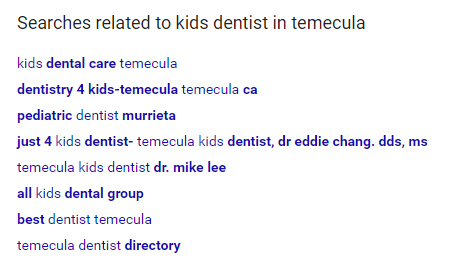You’ve probably heard the phrase that content is king. But what does that really mean for your dental practice website? Website copy is helpful in numerous ways. First, it guides a visitor through your website and helps them ultimately decide if they want to contact your practice, or hit the “back” button. It also can help your website’s rankings by improving your authority, so you appear in searches like “dentist near me.”
Here are 10 rules of thumb to follow when it comes to your dental website’s copy.
1. Make it easy to skim. Break up your paragraphs with headings and bullet points. Don’t try to stuff your paragraphs with unnecessary words and keywords for length. Quality beats quantity.
2. Sound natural. Don’t use big words just to sound fancy. It ends up taking away from the message. The average American reads at a 7th-grade reading level. Use free tools such as Readability-score.com to test the readability of your website copy.
3. Get to know your patients. And by this we mean, know what they’re looking for when they come to your website. Make that information clear and easy to find by using headers that contain keywords they’re likely to use when scanning your page e.g. labeling a page “Dental Cleanings” lets the user know exactly what the page is about.
4. Write for SEO. While you want to sound natural, you also want to write with search engines in mind. This means including keywords and phrases that you want your website to appear for in search results. Keywords should be chosen carefully identified after doing keywords research. One way to do this quickly is by entering a search in Google, and then listing the suggestion listed below the search bar. You can also look toward the bottom of the search engines results page for a complete list of suggestions:

5. Have great headlines. 80% of people will read a headline, and only 20% will read the actual article. To keep your visitors engaged, make a good title for your page. That said, know that “good” doesn’t mean overly creative. Make sure your message is clear and doesn’t get lost.
6. Focus on one topic per page. Make sure that all of your pages have one main topic that they focus on. The page should also end with one strong and clear call-to-action that tells visitors what you want them to do next, like click to schedule an appointment.
7. Be error free. Any grammatical or spelling errors on your website may give a signal to a prospective new patient that you are not thorough in your work, and may cause an element of distrust in your practice. Free software such as Grammarly is an excellent way to help you proofread your copy.
8. Provide proof. If you make a claim that you’re the best dentist in your city, show testimonials that support it. Showcase before and after photos. Anything that you can publish that shows your work first hand will help increase trust among prospective new patients.
9. Give added value. Your website should always give visitors a reason to come back. Publish educational articles, tips, or video that is relevant and helpful to your patients.
10. Site your sources. This goes without saying. If you’re quoting from someone or using a stat that you didn’t create on your own, make sure to give credit where credit is due.








